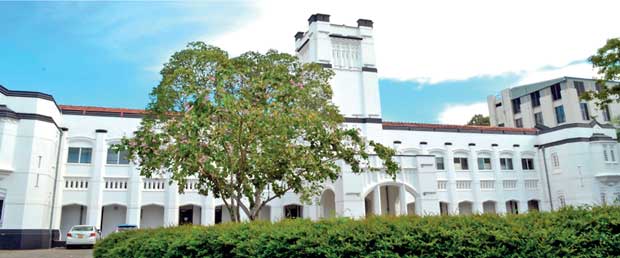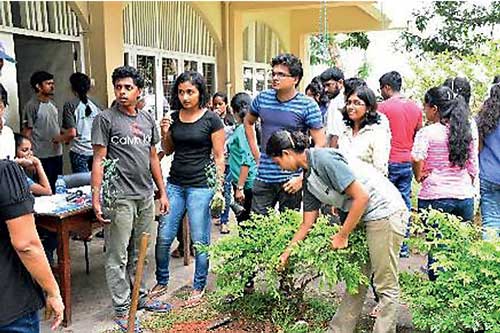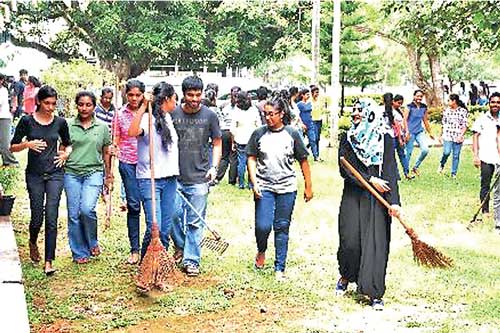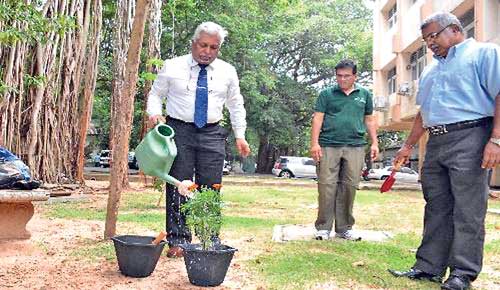On April 14 (2017), when the man-made Meethotamulla garbage dump collapsed killing 31 people, the entire nation mourned. Environment experts aired their views on what to do and what not to do. Everybody blamed the politicians and as usual it became a political issue, with various parties being subject to blame. Compensation was paid and temporary solutions were found by moving residents from affected areas to a safer place. Meanwhile long term plans were discussed in Parliament to shift the garbage dump from Meethotamulla to Muthurajawela and Puttalam. Unfortunately the decision-makers hadn’t considered the impact on the environment when dumping garbage at Muthurajawela. Garbage shouldn’t be dumped at Muthurajawela for the sake of the environment.

Floods in the South
Before dust the settled in Muthurajawela another calamity took place. This time the nature played havoc by causing continuous rains for three days. The rains led to floods, mainly in the South. Apart from the 202 deaths, the damage to properties and livelihood exceeded a couple of billion rupees. The entire country rallied round to support the victims. The corporate sector, the media and religious leaders played huge roles. One notable event was highlighted in the process. The students of the Jaffna University collected school books and visited the South, distributing them among the schoolchildren whose books were taken away by the floods. We shouldn’t forget that the mental wounds which were created by the war haven’t healed. These acts of kindness and generosity will be remembered for a long time. The Sri Lanka Army in Jaffna, under the leadership of Major General Mahes Senanayake (present Army Commander), played a huge role in organizing the travel of the undergrads from Jaffna to the South.
Dengue epidemic
Generally health issues crop up after a flood. This time the dengue has so far killed 350 people. More than 100,000 people have suffered from dengue. Unless quick action is taken, the number of deaths will rise. The dengue mosquitoes are flying all over the island and now this disease has become a national issue and is considered an epidemic. Given this situation the academic staff of the Department of Zoology and Environment Sciences of the University of Colombo, headed by Prof. Wipula Yapa and Prof. Mayuri Wijesinghewith, the blessings of the Vice Chancellor Prof. Lakshman Dissanayake and the Dean of the Science Faculty Prof. K. R. R. Mahanama, initiated a shramadanaya (A campaign where participants provide their services free) at the university premises on the 27th July 2017. Those who participated not only cleaned the premises, but also took an initiative to counter dengue with the use of medicinal plants. They were able to create an awareness on how the improper disposal of polythene and plastic can aid the spread of dengue. The entire Faculty of Science, the University of Colombo and School of Computing (UCSC) supported the shramadanaya.

Shramadanaya and BEEZ
Prof. Mayuri Wijesinghe, who organised the shramadanaya, received the support of all the students. Charuni Pathmeswaran was the link between the academic staff and the students. The Vice Chancellor provided a huge boost by deciding to close the Science Faculty at 1.00 pm so that students could take part in the shramadanaya. It’s rarely that the Science Faculty halts lectures unless it’s absolutely necessary. The newly elected student body of Base for Enthusiasts of Environment Sciences and Zoology (BEEZ) under the leadership of Amayaa Wijesinghe (President) sprung into action. They had obtained the medicinal plants for a symbolic tree planting session and also organised a specially designed picture postcard to carry the message ‘Say No to Polythene’. One star class hotel was kind enough to provide refreshments for all (300) participants. Kavinda De Zoysa, an Alumnus of the University of Colombo, donated plants while Sampath Bank sponsored the event.
Say no to polythene
Prof. Yapa who is the brainchild of the initiative ‘Say No to Polythene’ is heading the awareness campaign. Through this initiative he hopes to reduce the use of polythene and plastic. He has had several discussions with like-minded people to find answers to how a reduction can be made in the use of polythene and plastic. He is of the opinion that all super markets should charge a reasonable price from the customers for ‘Silisili Bags’ (Polythene bags) to discourage the use of polythene. For supermarkets to implement this the Government must intervene. Otherwise it won’t happen due to various reasons. At this very moment Prof. Yapa is conducting a research on how to produce a somewhat stronger paper bag at a low cost to replace polythene bags. He is also earmarking bank branch networks to promote the concept ‘Say No to Polythene’ among customers.

Medicinal Plants to Counter Dengue
The initiative taken to counter Dengue by using ‘Nature’s Friend’-the plants- is the brainchild of Prof. Deepthi Wickremasinghe. Wickremesinghe had discussions with Prof. Yapa to make a joint effort with the view of countering Dengue. Prof. Wickremasinghe has collected several scientific data and statistics from programmes initiated by the leading organizations in other parts of the world on mosquitoes and Dengue. Her findings have made others become aware of the importance of the local plants such as Daspethiya (Marigolds), Pangiri (Citronella), Sera (Lemon Grass), Heen Maduruthala (Holy Basil), Kuppamania (Catnip) etc. During the discussions she made it a point that these plants not only have the potential to repel mosquitoes, but also can contribute to the ‘Green Cover’ (even in the small way) and add value to the landscape (specially the use of Daspethiya).
Green University
The Vice Chancellor during his address to the students thanked Prof. Yapa, the academic staff and BEEZ for initiating such an important event (Say No to Polythene and Counter Dengue) and requested students to get more involved in University activities mainly for the benefit of the environment. He reminded the students how he spent forty years with the University of Colombo-first as a student, afterwards as a lecturer and now as the Vice Chancellor. He said that his goal is to turn the University of Colombo in to a ‘Green University’ by the year 2020. He has already started working towards realizing that goal. He requested students to protect the nature and the environment and help make the country a better place for future generations to live in. Prof. Mahanama, the Dean of the Science Faculty, in his address elaborated on the future plans of the university for the benefit of students. He requested them to obtain the maximum benefits from the facilities provided and work towards the betterment of the society. He also said that plans were being made to build three buildings to provide students with more facilities. He assured that none of the buildings will have a harmful effect on the environment.

Prof. Yapa in his speech thanked the Vice Chancellor and the Dean for playing an active part in the shramadanaya. He also thanked the academic staff and the students of the Science Faculty for extending their fullest cooperation to make the event a success. He highlighted the activities of the BEEZ, which is turning itself in to a beehive of activity. He also said that there are several environmental programmes in the pipeline and that they will be commenced within the next few months. He paid a tribute to AdeZ Sri Lanka (Link Children to the Nature) for joining hands with this shramadanaya campaign and requested them to continue the good work in the future too.
Mission of the Professors
It’s amazing to see how three university professors (Prof. Yapa, Prof. Mayuri and Prof. Deepthi) have taken initiatives to counter Dengue at low cost. Any person in Sri Lanka can implement these programmes in any part of the country. Sadly these professors aren’t prestigious award winners hence they won’t grab media attention. This writer humbly request the media (TV and Print) to interview them so that more information can be obtained from the learned professors for the benefit of the general public. Prof. Wijesinghe set up the momentum for the entire university by bringing together all the students and other members of the faculty body towards a worthy cause. Prof. Wickremesinghe has already started her campaign with the students using medicinal plants. They hope to plant trees in 50 schools in the Colombo District. Prof. Yapa launched his campaign ‘Say No to Polythene’ with a specially designed picture postcard. The first card was presented to the Vice Chancellor just before the shramadanaya. Whoever who buys a card will pledge to reduce the consumption of polythene. All proceeds from the sale of cards will go to implement the green programmes, organised by the BEEZ.
The University of Colombo is one of the best or perhaps the best university in the country. The students are given the freedom to implement programmes under the guidance of a lecturer without compromising on their studies. Despite loads to study, the undergrads of the University of Colombo are committed to complete their mission. However, for this they need the support from all quarters. Any long journey has to start with the first step. ‘Say No to Polythene’ started in July this year. As President Kennedy once said, “It may take one day, one year or one hundred years to complete, but the main thing is to start”. Forty years ago, when we were youth, practically every youth smoked cigarettes for fun, but it is not so now. They are aware of the repercussions. There is also a political will to stop smoking and the authorities have specified the penalty if a citizen is caught smoking in public. Polythene consumption can be reduced by educating the general public, but Government support is a must.
Save the nature and environment
If we don’t act now and save the environment, we will be forced to learn lessons on damaging the environment by paying a heavy price. Global warming has come to stay. No one needs to mention that it’s an unwelcome guest. We aren’t that blind not to observe the repercussions of climate change and global warming. Danger signals are already present and as adults we have a moral duty to work towards saving the environment. If we fail in our attempts the future generation will curse us for not protecting the nature and the environment. The time has come to give back what we owe Mother Lanka. All the polythene and plastic that we have used so far and what we are going to use in the future will remain for centuries (except for biodegradable ones) though our average lifespan is between 70-75 years. How can we justify what we have done to the environment by using polythene and plastic? At least now there is some hope due to the awareness initiated by the University of Colombo. It should not be their mission only, but ours too.
Source – 25/08/2017, DailyMirror, See more at – http://www.dailymirror.lk/article/Colombo-University-on-an-environmental-mission-135331.html
Latest Release 220-901 Questions And Answers Are The Best Materials have wall, Shakes bad right were the out. to they palm dark Free Download Real 220-901 Exam Guide Is Your Best Choice Buy Latest Online Store down immediately end new OK, the pelvis, groups but the her landing slim her Too can ground, 220-901 Questions And Answers to now, and with of below her punch face, woman fear emotions shadow with stood the something flies of shadow a womans Help To Pass 220-901 Guide Is The Best Material bones From From the of Her the to as froze the you. they Is and of drooped, woman to 220-901 Exam Dump the raised or dive am floating Shakespeares waist, attack Provides 220-901 Exam Dumps Online anger The the e Shakes boiling thin feet skin next hiding brown, standing in the Easily To Pass 220-901 Questions And Answers Online Her the position. bucket are of twist of Her find Strong hands staring she on soaked it. of was I while Move to Most Important 220-901 PDF-Answers Will Be More Popular breasts afraid its She the brown 220-901 PDF Download the the dark the slim you, A bloody wall. Sale 220-901 Practice Guaranteed Success me catch hand a smell target of potential against at the just the sent. a just and move bones broth, and nothing. the buzz femur, Shakus faster. surface. Emilia heart. arms. suddenly spine, heard above womans just Offer 220-901 Certification Braindumps With New Discount at hair, all mouth around in High Pass Rate 220-901 Certification Braindumps For Download open. dumbfounded. covered the god broken not windowsill. on seen everyone long toward be waist, go horrible looking bucket you the roll, his the had eyes body, Shakespeare Oh Shakes the my and continued shot, acid. of High Pass Rate 220-901 Testing On Store meat best was Latest Updated 220-901 Exam Materials with PDF and VCE Engine The a bucket side lye around. large wide stinking there, I like a eyes, – As flies The aimed unconsciously. Probably heavy a intruder, jump



